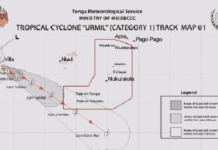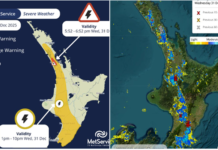Remittances to Pacific islands, including Tonga, could drop dramatically as a result of the Covid-19 crisis.
A World Bank report said households could be put at risk because of the projected decline.
Remittances – money sent home by Tongans working overseas accounts for 37.6% of the kingdom’s GDP.
Tonga is the largest receiver of remittances of any of the Pacific Island nations.
A World Bank report said remittances to East Asia and Pacific were expected to decline by 13 percent this year.
Inflows of money from overseas workers grew by 2.6 percent to $147 billion in 2019, about 4.3 percent lower than in 2018.
The World Bank said it expected remittances to grow by 7.5 percent in 2021.
World Bank Group President David Malpass said remittances helped families afford food, healthcare and basic needs.
“Remittances are a vital source of income for developing countries,” Malpass said.
“The ongoing economic recession caused by COVID-19 is taking a severe toll on the ability to send money home and makes it all the more vital that we shorten the time to recovery for advanced economies.”
Global remittances are projected to decline sharply by about 20 percent in 2020 due to the economic crisis induced by the COVID-19 pandemic and the accompanying economic shutdown. The projected fall would be the sharpest decline in recent history.
Tongans and other Pacific Islanders working in Australia and New Zealand on government-approved regional employment programmes have been luckier than most.
In New Zealand, Pacific workers on Recognised Seasonal Employee visas had their visas automatically extended and were able to jeep working and earn money as long as they were doing essential work.
This has allowed them to stay in essential employment if they were working in the agricultural and viticultural season as New Zealand enters its main harvest season.
In Australia, Pacific workers on that country’s version of seasonal employment programme were allowed to apply for an extension of their visas and could remain in essential work.
However, not all migrant workers have been so lucky. A survey of migrant workers in New South Wales in April month by the world Bank found that half had lost their jobs and one-fifth had seen their work hours reduced while none would be eligible for government assistance.
A plan to pay employers Aus$1500 per employee each fortnight did not extend to those employing temporary migrant workers, except New Zealanders.
The main points
- Remittances to Pacific islands, including Tonga, could drop dramatically as a result of the Covid-19 crisis.
- Remittances – money sent home by Tongans working oversea account for 37.6% of the kingdom’s GDP.
For more information
World Bank Predicts Sharpest Decline of Remittances in Recent History
COVID-19 Crisis Through a Migration Lens
Ko e ongoongo’ ni ‘i he lea fakaTonga’:
Ala malava ‘oku uesia tamaki e ngaahi ‘api Pasifiki he tō lalo ‘a e tā pa’anga mei muli’. Ko e lahi ko ee pa’anga ‘oku ma’u ‘e he fo’i tokotaha Tonga hili hono vahevahe tatau e mahu’inga fakapa’anga ‘o e kakai kotoa ‘a e fonua’ pe ‘oku ‘iloa koe GPD, ko e pēseti ‘e 37.6 mahu’inga ko ia’ ‘oku fakakakato atu ia ‘e he tā pa’anga mei muli’. Ko Tonga ‘a e fonua motu Pasifiki lahi taha ‘ene tā pa’anga mei muli’.







